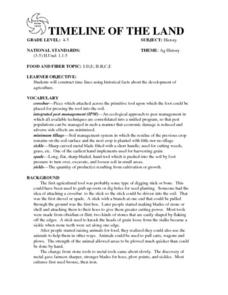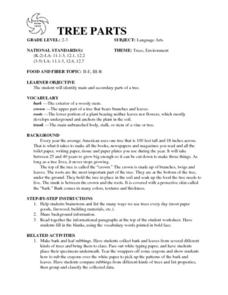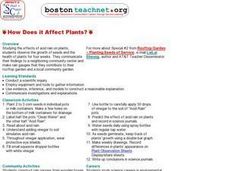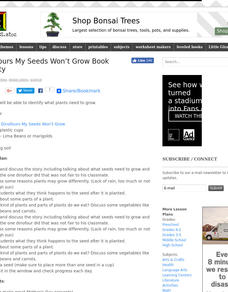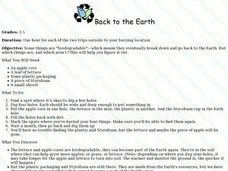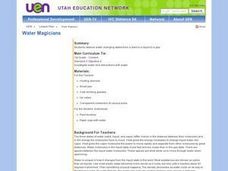Curated OER
Great River Bend Adventure
Students use their imagination. They discuss the 4 C's of teamwork: Concentration, Communications, Coomperation, and Consideration. Students discuss the safety guidelines of the project. They complete a rope maze. The group walks...
Curated OER
Recycled Water?
Students participate in a hands-on activity to investigate how water is recycled in a small environment, and determine how water is cycled on earth.
Curated OER
Building the Terrarium
Pupils draw a layout of their proposed terrarium. In this social studies lesson, students discuss how Mayans farm to produce food for the family. They compare their farming method with modern farming practices.
Curated OER
PLANTING A TREE
Students study how to select the right tree for the right site, how to properly plant a tree, and how to mulch and water a tree.
Curated OER
TIMELINE OF THE LAND
Learners construct time lines using historical facts about the development of agriculture. Students research specific dates and events and report their findings to the class. Learners tape or glue the sections together sequentially in a...
Curated OER
Weedy Socks & Wheels
Pupils engage in a lesson plan that is concerned with the concept of using socks in order to collect weed seeds. They conduct research in order to illustrate the ease of how weeds are spread from one area to another. Students conduct the...
Curated OER
Growing Jack and the Beanstalk Plants
First graders investigate how plants grow by growing their own "beanstalk", (after reading "Jack and the Beanstalk") and record their observations daily in a science journal.
Curated OER
Creating the Water Cycle
Students create a terrarium to examine the stages of the water cycle. In small groups, they plant and water a seed in an enclosed plastic container. Each day they diagram and write observations of the terrarium using water cycle vocabulary.
Curated OER
TREE PARTS
The student will identify main and secondary parts of a tree.1. Help students brainstorm and list the many ways we use trees every day (most paper goods, firewood, building materials, etc.). 2. Share background information. 3. Read...
Curated OER
Water Quality
Learners conduct experiments to study the quality of water. They examine how pollutants get into and affect the water supply in this unit.
Curated OER
Our Schoolsyard is Full of Biology
Students study the habitats found in their schoolyard. They apply firsthand, what they have learned in the classroom to something familiar to them. Students look at biotic, abiotic habitats. Small groups will present their findings to...
Curated OER
What's The Flow?
Students examine urban runoff and identify peak flows. They examine causes for different flow rates, and complete worksheets and a graph.
Curated OER
Little Bloomers: Gardening With Trees
Young scholars identify the parts of tree flowers. They examine the role they have in pollination. They discuss trees that do not flower as well.
Curated OER
How Does it Affect Plants?
Students examine the effects of acid rain on plants. They observe the growth of seeds and the health of different plants for a month. They share their findings with the community.
Curated OER
Dinofours My Seeds Won't Grow
Students listen to a read aloud, Dinofours My Seeds Won't Grow. They talk about what plants need to grow and study the parts of plants. They discuss what types of plants we eat after which they plant a seed in order to observe the growth...
Curated OER
Back to the Earth
Students conduct an experiment in which they bury four objects (apple, lettuce, plastic and styrofoam) in the ground and come back to observe them a month later. They consider what biodegrades and how it affects our planet.
Curated OER
The Principles Of Composting
Students put items in a plastic bag and watch the effects of composting. While completing the experiment, students answer questions and ask permission to start their own compost pile at home.
Curated OER
Cavern Geology: Speleothem Construction
Students discover how underground rock formations grow. They perform various activities based on grade level.
Curated OER
Terrariums for Project Pals
Students identify the components needed by plants to survive in the terrarium. In this biology lesson, students build their own terrariums using materials available. They present their project in class.
Curated OER
NATIVE AMERICANS
Pupils study the importance of nature to Native Americans and discover the growth stages of Northern beans and mustard seeds.
Curated OER
Our Friends the Trees
Pupils build an animal habitat. In this animal habitats lesson, students create dead-wood habitats and observe the habitat over a period of weeks.
Curated OER
The Mystery of the Sponge
First graders observe while water is absorbed into a sponge. They experiment by putting a sponge on yardstick and watch while water dries and the weight changes.
Curated OER
Water Magicians
First graders observe water changing states from a solid to a liquid to a gas. They predict what they think happen to ice cubes as they sit out. They paint water with paintbrushes outside the classroom in the sun and watch the water...
Curated OER
Which Way to Roots Grow?
Second graders explore roots and how they grow. They observe as seeds planted in various directions grow and record their observations. Students discuss the direction in which the roots are growing.






